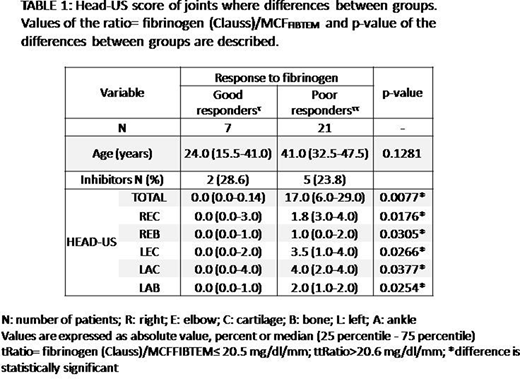Background:Joint damage is the most frequent and most debilitating comorbidity of haemophilia and can be prevented by adequate prophylactic treatment. Nevertheless, many causes and not only plasma levels of the factor affect joint damage in severe haemophilia (SH) patients. One to be considered is variability on fibrin polymerization capacity since it might influence the bleeding tendency and, consequently, would affect the joint condition in SH patients. To our knowledge, there are not enough studies about that.
Aim:This work aimed to evaluate if there exists a relationship between fibrin capacity of polymerization and joint condition in SH patients.
Methods:This is a prospective and transversal study that was approved by Ethics Committee from Hospital Universitario La Paz. Twenty eight SH patients (25 with SHA, 5 of them with inhibitors; 3 with SHB, 2 of them with inhibitor), median age [p25-p75]=41 [29.8-51.3] years old) were recruited. Joint condition was evaluated using the HEAD-US score. Plasma level of fibrinogen (Fib) was determined by Clauss method. Rotational thromboelastometry (ROTEM) was performed with fibTEM, an extrinsically activated test with tissue factor and the platelet inhibitor cytochalasin D. fibTEM results correlate well in many cases with the Clauss Fib assay, but is additionally influenced by fibrin polymerization ability which cannot reliably be detected with clotting tests. Fibrinogen capacity to increase the clot strength was evaluated by the ratio R= Fib/fibTEM maximum clot firmness (MCFfibTEM) which means the plasma concentration of Fib needed to increase maximum clot firmness in 1 mm. Data were analysed with GraphPrism Pad 6.0.
Results:Median value of Fib was 306 [263-341] mg/dl, MCFfibTEM = 12 [10-15] mm and R= 25.0 [20.5-29.5] mg/dl/mm. Patients were classified taking into account the value of the 25th percentile of each variable (Fib, MCFfibTEM and R). Subjects with Fib ≤ 263 mg/dl were considered patients with low fibrinogen level, those with MCFfibTEM ≤ 10 mm were considered patients with low platelet independent maximum clot strength and subjects with a R < 20.5 mg/dl/mm were considered good responders to fibrinogen. Based on this analysis, neither Fib nor MCFfibTEM influenced the joint condition. However, patients with poor response to fibrinogen (R ≥ 20.6 mg/dl/mm) had a significantly greater joint damage than the good responders to fibrinogen (R < 20.6 mg/dl/mm) (Table 1).
Poor responders to fibrinogen had frequently joint damage in ankles followed by elbows and knees being cartilage the most commonly affected joint compartment. Good responders to fibrinogen only presented milder joint alterations in elbows and ankles.
Conclusions: Our results suggested that polymerization capacity of fibrin may be variable between patients with SH and might influence joint condition. More patients need to be recruited to confirm this finding.
This work was supported by grants from FIS-FONDOS FEDER (PI19/00631 and PI19/00772).EMM holds a predoctoral fellowship from Fundación Española de Trombosis y Hemostasia (FETH-SETH).
Fernandez-Bello:Pfizer:Speakers Bureau;Novartis:Speakers Bureau;Stago:Speakers Bureau;Roche:Speakers Bureau;NovoNordisk:Current Employment, Research Funding, Speakers Bureau;Takeda:Research Funding, Speakers Bureau;SOBI,:Research Funding.de la Corte:Pfizer:Research Funding, Speakers Bureau;NovoNordisk:Research Funding, Speakers Bureau;Takeda:Speakers Bureau;Roche:Research Funding, Speakers Bureau;Sobi:Research Funding, Speakers Bureau;Bayer:Speakers Bureau.Alvarez Román:Novartis:Speakers Bureau;Bayer:Consultancy;Grifols:Research Funding;Pfizer,:Research Funding, Speakers Bureau;Roche:Speakers Bureau;NovoNordisk,:Research Funding, Speakers Bureau;Takeda:Research Funding, Speakers Bureau;SOBI,:Consultancy, Research Funding, Speakers Bureau.Martín:SOBI:Research Funding;NovoNordisk:Speakers Bureau;Novartis:Speakers Bureau;Roche:Speakers Bureau;Pfizer:Research Funding, Speakers Bureau.Rivas Pollmar:Pfizer:Speakers Bureau;Roche:Speakers Bureau;Novartis:Speakers Bureau.García Barcenilla:Novartis:Speakers Bureau;Bayer:Speakers Bureau;Roche:Speakers Bureau;Pfizer,:Speakers Bureau;Takeda:Research Funding, Speakers Bureau;NovoNordisk:Research Funding, Speakers Bureau.Canales:Janssen:Honoraria;Sandoz:Speakers Bureau;Takeda:Speakers Bureau;Karyopharm:Honoraria;Novartis:Honoraria;Celgene:Honoraria;Roche:Honoraria;Gilead:Honoraria;Sandoz:Honoraria;iQone:Honoraria;Janssen:Speakers Bureau;Janssen:Honoraria;Roche:Speakers Bureau;Karyopharm:Honoraria;Sandoz:Speakers Bureau;Novartis:Honoraria;Takeda:Speakers Bureau;Roche:Honoraria;Sandoz:Honoraria;Janssen:Speakers Bureau;Roche:Speakers Bureau.Butta:Takeda:Research Funding, Speakers Bureau;SOBI:Speakers Bureau;Pfizer:Speakers Bureau;ROCHE:Research Funding, Speakers Bureau;Novartis:Speakers Bureau;Grifols:Research Funding;NovoNordisk:Speakers Bureau.Jimenez-Yuste:F. Hoffman-La Roche Ltd, Novo Nordisk, Takeda, Sobi, Pfizer:Consultancy;Grifols, Novo Nordisk, Takeda, Sobi, Pfizer:Research Funding;F. Hoffman-La Roche Ltd, Novo Nordisk, Takeda, Sobi, Pfizer, Grifols, Octapharma, CSL Behring, Bayer:Honoraria.
Author notes
Asterisk with author names denotes non-ASH members.


This feature is available to Subscribers Only
Sign In or Create an Account Close Modal